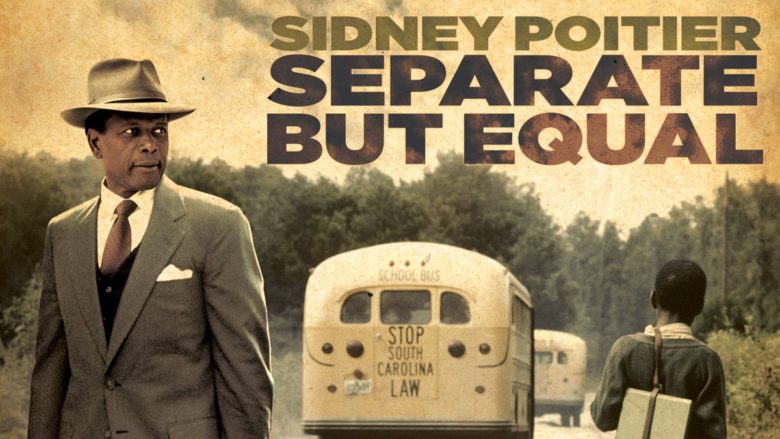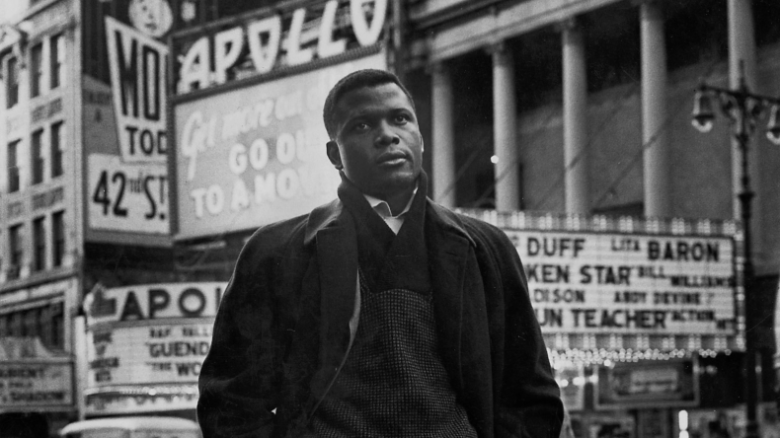UB Spotlight ‘Separate But Equal’ | ‘Brown vs. Board of Education’ 70th Anniversary
Starring Academy Award Winners Sidney Poitier and Burt Lancaster.

Today marks the 70th Anniversary of Brown vs. Board of Education, on May 17th, 1954, the historic Supreme Court Case that outlawed racial segregation in public schools. Yet, Racial segregation in schools across the country has increased dramatically and the U.S. has moved toward policies that increase the isolation of Black and Latino students by race and poverty.
The decision in Brown v. Board of Education was a major victory for the civil rights movement and dramatically altered American society.
Paramount Home Entertainment has re-released, writer/director George Stevens, Jr.’s Emmy Award-winning masterpiece “Separate But Equal” on DVD. In addition to the feature presentation, the DVD includes the 1954 CBS News Special “See It Now: A Study of Two Cities” hosted by Edward R. Murrow.
Starring Academy Award winners Sidney Poitier and Burt Lancaster, and featuring performances by Oscar nominee Jeffrey Wright and Emmy winners Richard Kiley and Cleavon Little, this powerful miniseries premiered in April of 1991 and received widespread critical acclaim.

A magnificent and exhilarating dramatization of a critical turning point in the nation’s history, “Separate But Equal” is a phenomenal achievement and one of the greatest courtroom dramas ever made.
It began in small-town South Carolina and blossomed into the most important judicial decision of the 20th century. At its heart lies an incredible tale of national policy created by a cunning lawyer, powerful back-room deals, and the desire of a small boy to live the American Dream.
Not only is the film a reflection of Sidney Poitier’s acting legacy but it is also a poignant reminder of our history and why we must ensure the country does not halt the progress that has been made.
In 2019, UB spoke to Robert Townsend, and asked who inspired him? “That would be Sidney Poitier! When I was a kid, I didn’t see that many images of people of color on television. I remember seeing a lot of the shucking and jiving and you know stereotypical roles. The first person I saw on television, that had dignity was Sidney Poitier.” Mr. Townsend went on to say; “when I became an adult and became famous. I called him right away. He educated me and I asked him, how did you get to have dignity in the 50s? When so many people of color had their head down? He said, the power to say no. He said I didn’t except everything that came along. I turned down, more than I excepted. That’s kind of been my mantra since I met him. So he’s my hero.”
In the rich tapestry of Hollywood’s history, few names shine as brightly as Sidney Poitier’s. His presence on screen wasn’t just about acting; it was a seismic shift in representation and equality. Paramount Home Entertainment’s re-release of Separate But Equal, is a perfect time to reflect on Poitier’s legacy and his parallel journey to civil rights titan Thurgood Marshall.
Born in Miami and raised in the Bahamas, Sidney Poitier faced a journey filled with obstacles on his path to stardom. Yet, like Marshall’s tireless pursuit of justice in the courtroom, Poitier’s ascent in Hollywood was marked by perseverance and resilience.
“Separate But Equal,” originally released in 1991, chronicles the case of Brown v. Board of Education, which challenged the doctrine of “separate but equal” and paved the way for school desegregation. Poitier’s portrayal of Thurgood Marshall was more than a role; it was a homage to the man who blazed a trail for equality.
The parallels between Poitier’s journey in film and Marshall’s fight for civil rights are striking. Both faced formidable odds, entrenched prejudices, and systemic barriers. Yet, through their determination and commitment to justice, they reshaped the narrative of race in America.
Poitier’s breakthrough came at a time when Hollywood was rife with stereotypes and limited opportunities for black actors. He refused to be restricted to certain portrayals and challenged conventions with each performance, demanding to be seen as a multifaceted individual.
Similarly, Thurgood Marshall’s legal battles weren’t just about winning cases; they challenged systemic racism to its core. From Brown v. Board of Education to his historic appointment as the first African American Supreme Court Justice, Marshall’s legacy is a testament to the power of the law to effect social change.
As “Separate But Equal” returns to the screen, it serves as a reminder of the battles fought and the progress made in the pursuit of equality. Poitier’s performance as Marshall is not just a tribute; it’s a celebration of resilience, courage, and the human spirit.
In today’s world, where injustice still exists, Poitier’s legacy reminds us that the fight for equality is ongoing. As we revisit Separate But Equal let’s honor Marshall and celebrate Poitier’s enduring contribution to the struggle for civil rights.
In the end, it’s not just about a movie—it’s about a movement. Sidney Poitier used his art to change hearts and minds, and his legacy continues to inspire us today.
Check Out The UB Extended Preview!









You must be logged in to post a comment.